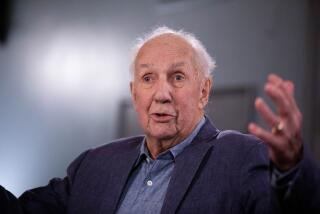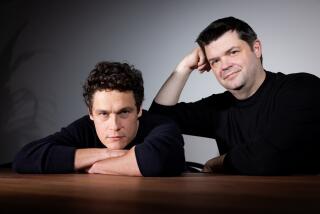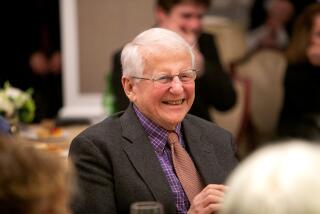Andrew Garfield is ‘getting on the fridge’ as Biff, Spider-Man
NEW YORK — Seeing as he grew up in the county of Surrey in southeast England and was called one of Britain’s rising stage actors at an early age, you might expect that Andrew Garfield has Sir Laurence Olivier as one of his role models.
But his adolescent hero was an entirely different kind of star: Muggsy Bogues, the short, quick, ball-stealing guard for the Charlotte Hornets NBA team in the 1980s and ‘90s.
“I never wanted to be an actor, I wanted to be the next Muggsy,” recalls the 28-year-old Garfield. “I was skinny and short. I’m no longer short [6-foot-1]. But I’m still skinny. I’m OK with that now. But I struggled with it. It’s very weird to beat yourself up for being born in the wrong body.”
Feelings of displacement are central to two roles that have raised Garfield’s profile since his performance as Eduardo Saverin in “The Social Network”put him on the map. First, there’s Peter Parker in the forthcoming “The Amazing Spider-Man.” And then there’s Biff, the onetime football hero-turned-fugitive loser, in Mike Nichols’ Broadway revival of Arthur Miller’s “Death of a Salesman.”
“Salesman,” which was scheduled to conclude its sold-out limited run Saturday, has earned seven Tony Award nominations, including best production, best director, and for three of its actors: Philip Seymour Hoffman, as the wounded and flailing Willy Loman, Linda Emond, as his patiently suffering wife, and Garfield, as Biff, the victim of his father’s fierce ambitions for him and his own pathetic self-delusions.
Critics seemed pleasantly surprised by the power of Garfield’s performance. Los Angeles Times critic Charles McNulty singled the actor out for his fearlessness in exposing “primal wounds that in real life are too painful to reopen,” noting that it provided the “turbo-charged catharsis” of a great play. The New York Times’ Ben Brantley praised the “searing heat” the actor brought to his confrontations with Hoffman.
Nichols says he’d seen Garfield in earlier movies such as “Lions for Lambs” and”Boy A”but it was “The Social Network” that demonstrated for him the actor’s “astonishing emotional power.” The director added, “That scene in which they are trying to get him to sign something and he senses the betrayal? Extraordinary. He has a tremendous career ahead of him.”
Sipping a ginger ale in a coffee shop before an evening performance of “Salesman,” Garfield is thoughtful, affable and wryly self-mocking. He moves his hands through a thick mop of hair and furrows his brow before expressing himself in a torrent of words. The British accent belies his birth in Los Angeles, where he lived until age 3, when he and his elder brother were whisked to London by his American father and English mother.
Wearing khakis and a pinstriped sport shirt over a V-neck sweater, he becomes increasingly animated, whether quoting from a favorite Gil Scott-Heron song or recalling, with a laugh, how he’d imitate his idol Michael Jackson in the days when rock star ambitions supplanted his basketball dreams.
On this late afternoon, he’s feeling “spread thin,” after one of the hectic theater awards-season receptions.
“It’s an honor to be included,” he says. “But I get so nervous and anxious at these things that I actually become ill.”
He considers the chance to meet his peers a perk. “I met Ricky Martin,” he says brightly of the star of the revival of “Evita.” “He’s so sweet, and when he says goodbye to you, he puts his hand on his heart and says, ‘Love and light.’ And I thought, ‘Aaaah, nice, Ricky, really nice. That’s so lovely.’”
If there’s no irony, it’s because Garfield considers himself heliotropic — “The sun to me is everything” — even while he is trying to balance a love of light with his darker struggles. Like Biff, he says that he is much more comfortable physically. But the former gymnast and swimmer, now an avid surfer, says he lives in his head a good part of the time.
“I am neurotic that way,” he says. “I know myself pretty well, why I am the way I am comes very, very easily. That can be both a gift and a curse because you can tend to over-analyze.”
It has been a difficult, if rewarding, experience to plumb his own feelings of shame, guilt and “never measuring up” to play Biff. In previous stage roles, Garfield says, he’s always been able “to finagle my way” through a performance. Not this time.
“There is something in this play that doesn’t allow you to feel truthful unless you are literally baring every aspect of your soul,” he says.
Garfield says that the pressure to succeed came from him, not his father, a swimming coach, or his mother, a nursery school assistant.
That self-imposed tension is what he calls “getting on the fridge.” This is how he explains it. Children draw out of the purest of desires, happily lost in a pleasurable and unencumbered artistic impulse. “Then mum, or someone you need validation or love from, comes along and says, ‘Oh, that’s good,’ and they put it on the fridge,” says Garfield.
“And suddenly your instinct and your need [to create] change. You don’t draw anymore only because it feels good. You draw because you need to get on that fridge. And I’ve struggled with that, and I’m struggling with that still.”
Garfield recalled his years as a high school jock. “It was this endless battle of ‘Am-I-going-to-win-and-if-I-don’t-I’m-nothing,’” he says, in a funny mimicry of his younger, angst-ridden self. “And if you won, then you could survive for the next two weeks. It was boring and upsetting and no life. So, yeah, I totally knew what Biff goes through and the need for him to take that power away from Willy.”
Garfield’s mother encouraged her son to take the creative path. While at private school, he started acting in plays and was encouraged by his teachers to pursue it as a career. That led him to enroll in the University of London’s Central School of Speech & Drama. But, though often exhilarating, it was also anxiety-inducing, especially after he was chosen to participate in an annual student acting festival at London’s Globe.
Honoring the Shakespearean tradition of having young males assume female roles, his acting coach cast him as Ophelia opposite a classmate’s Hamlet in his first public performance outside school plays. Playing a woman was the least of it. He was paralyzed with fear, terrified, he puts it, “of being judged as a phony and a fraud.”
A London busker came to his rescue.
“We had a few hours so I decided to take a walk along the South Bank on this gray London day,” recalls Garfield, “and there he was, on the sidewalk, singing a Don McLean song [‘Vincent’], which I’d adored on an instinctual level but had never really heard until that moment. He wasn’t singing it very well, but fine, perfectly fine, and it was a song by an artist about an artist [Van Gogh] sung by an artist who had that morning decided to get out of bed and give whatever he had to give. The clouds parted, the sun came out and what he gave me was the most profound message I’d ever received: It doesn’t matter what you have to offer. Just offer it.”
As the end of the play’s run was in sight, followed by the June 10 Tony Awards, Garfield was bracing for the response to the movie he had completed before he began “Death of a Salesman”: the latest”Spider-Man,”which reestablishes the franchise with new actors and a new director. It will be released July 3.
He says he was ambivalent about being tapped for the role. Although he was grateful for the chance to play a character he has loved since childhood, he’s wary of the onslaught of publicity that accompanies it. He is highly protective of his romantic relationship with Emma Stone, whom he met when they began work on “Amazing Spider-Man.”
It poses a bit of a moral quandary for him. Garfield says that, like Biff, he realizes that his “authentic self” resides not in fame, money and success but in being a responsible part of something greater. “You don’t have to be ‘special,’ sometimes just being born is enough, breathing, being good to people, you know what I mean?”
But the moment he sets foot in Los Angeles, he adds, it’s hard not to get caught up in the mass mind-set of a movie factory town with its obsession with box-office grosses and where one fits into the pecking order. His competitive side comes to the fore, and he doesn’t like it.
“I love L.A., I love the beach, the water, I have my favorite rituals and restaurants,” he says. “But it’s difficult for me because I become obsessed with things, all that stuff that doesn’t interest me but interests my ego.”
Garfield says he admires how Nichols, Hoffman and Emond conduct themselves in the larger entertainment world.
“As cheesy as this sounds, Mike lets his light shine. He is just who he is, and for him to have carved that out for himself, in an industry like this, is an example I’d want to follow. And I’m on stage with people, Phil and Linda, who just express what they want to express and stay true to themselves. It’s as simple — and as difficult — as that.”
He hopes to keep focused on why he agreed to star in “Spider-Man” in the first place. He talks about an article in the Los Angeles Times about Nicholas Hammond, who played the role of Peter Parker in the 1970s live-action TV series.
“It was an amazing interview,” he said. “I’d love to sit down and talk with him because I give a lot of the same answers he gave — the universality of the story, the responsibility to use power to do good, the hope that Peter Parker represents. You never want to lose sight of that.”
The first time he put on the Spider-Man costume was unforgettable. “The moment before was pure bliss and then it was awkward, actually, to get it on and especially to wear,” he says.
He hopes to buy one of the costumes created for the film if he can get it at cost. (The price tag is about $20,000.)
“It’s an investment,” he says with a wicked smile. “So that when I’m broke — after they fire me from the second ‘Spider-Man’ movie — I’ll be able to sell it to fund my heroin habit.”
He’s joking of course. Right now the addiction is “looking for the light” in his life and work. “”I’ve been lucky to have found it in art, in reading it, listening to it, acting in it. Biff’s journey is hopeful. The beginning of his life starts at the end of the play.”
What: The Tony Awards, hosted by Neil Patrick Harris
When: 8 p.m. PDT June 10 on CBS
(Live webcast on TonyAwards.com beginning at 3 p.m. PDT)
More to Read
The biggest entertainment stories
Get our big stories about Hollywood, film, television, music, arts, culture and more right in your inbox as soon as they publish.
You may occasionally receive promotional content from the Los Angeles Times.






